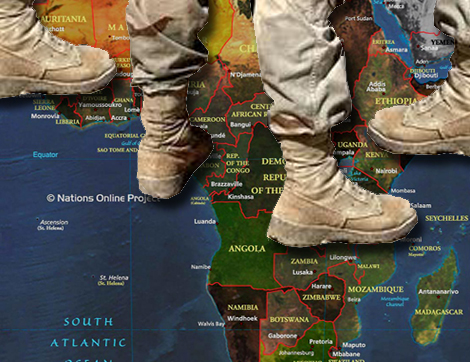
• Humanitarian relief efforts mask ulterior agenda
By Richard Walker
As the war in Afghanistan winds down, the Pentagon’s focus has shifted to Africa and a new kind of warfare, using drone and missile attacks, small Special Forces teams and a mixture of Marines and special advisers to train African national armies to act as proxies in the American global empire.
Much of this warfare is being promoted under the rubrics of humanitarian aid and combating piracy. While those may be two reasons for establishing a bridgehead on the African continent they do not tell the complete story. Secretly, the objective has been to wage war against a range of perceived enemies, with fewer boots on the ground and less accountability to the American electorate.
When Barack Obama sent 100 Special Operations troops to Uganda in 2011, his declared aim was to hunt down leaders of the so-called Lord’s Resistance Army, founded by Joseph Kony. That, however, was a smokescreen. As of Feb. 5, 2012, the U.S. military presence in Uganda has expanded, working to eliminate another group that has never attacked the United States—Harakat al-Shabaab al-Mujahideen, which operates in nearby Somalia and elsewhere in East Africa.
That became apparent with the arrival of soldiers from the Marine Force Reserve. One of its officers, Cpl Jad Sleiman, had this to say about its role: “Special Purpose Marine Air Ground Task Force 12, the Marines’ Sicily-based parent command, is tasked with sending small training groups into Africa to partner with local militaries in an effort to indirectly blunt the spread of extremist groups across the continent. The task force has dispatched teams across a wide swath of Africa over the course of their six month deployment in support of Marine Forces Africa, sending anywhere from five to 50 Marines into partner nations for days to months at a time.”
Uganda is not the only East African nation where there is a growing U.S. military presence. Others include Kenya, Tanzania, Burundi, Djibouti, Eritrea, Ethiopia, Rwanda, South Sudan and Somalia.
Some of these nations are not merely hosting U.S. military trainers but have secret bases from which Special Forces can be dispatched to hit targets across the region. The largest base is Camp Lemonnier in Djibouti, but there are other U.S. sites in Ethiopia, which have been designed as launch pads for attacks on groups in Somalia and Yemen and for covert operations against Iran. Ethiopia, which has its eyes on Sudan’s oil, has had a long relationship with the Pentagon. As far back as 2003, it provided training facilities for the U.S. 20th Mountain Division.
The Horn of Africa is a powder keg of tribal friction. It is also an area rich in energy resources and is geographically positioned to allow the U.S. to keep eyes on Iran, Libya and Egypt. By maintaining only specialized forces in host nations like Uganda, the Pentagon knows there is less likelihood Africans will have flashbacks to the colonial decades when the British, French and Dutch controlled the region with considerable brutality.
Nevertheless, there is a real risk that the deeper the U.S. becomes entangled in the internal politics of some of these countries, the greater the likelihood secret wars will develop into larger conflicts. Israel also has a keen interest in the region and is believed to have surveillance and Special Operations posts in Eritrea and Ethiopia.

Richard Walker is the pen name of a former N.Y. news producer.

